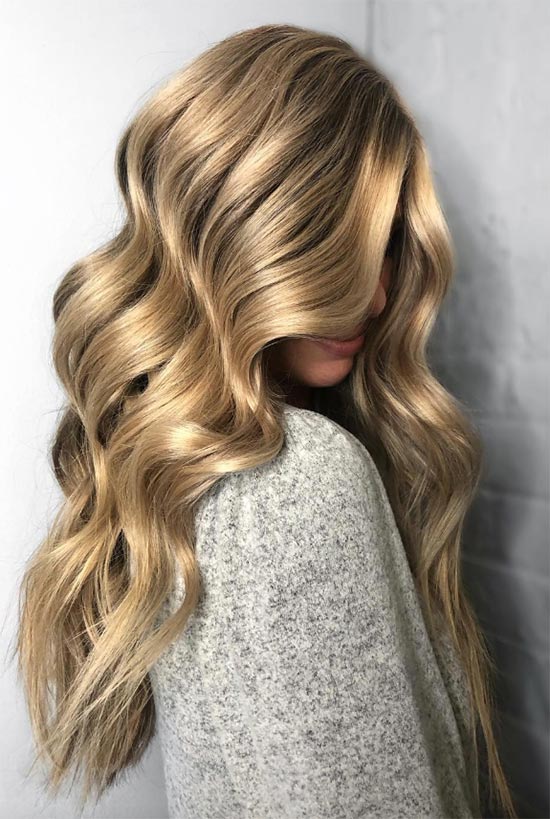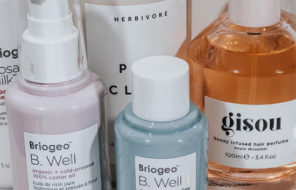One of the most misleading concepts of how to deal with oily hair is to just wash it more, but the shocking news is that this is the wrong way to go! Washing oily hair more frequently is counterproductive, and you should wash your hair based on your hair type and use a specially designed shampoo for oily hair. In this article, we have put together a plethora of oily hair care tips and tricks to ensure that you don’t have to put up with greasy hair.
In this article:
What Causes Oily Hair?
You know oily hair when you see it. Strands look stuck together and sometimes shiny in a way that does not look healthy but has an opaque cast to it. For people with lighter colored hair, oily hair will look darker and more clumped up at the roots. For darker hair, it looks clumped up or like you applied a clear gel to sections near the roots of your hair.
Oily hair can be caused by several different things ranging from hormones to product build-up. Identifying the how and why that makes your hair feel greasy and oily will help you choose the best shampoo for greasy hair. Armed with the right tools, the battle against oily hair is easy to win, so let’s look at the contributing factors first.
Oily hair is a result of your scalp’s sebaceous glands being overactive and producing too much sebum. It is designed to smooth and protect the hair strand, sealing in moisture and protecting the cuticles on each strand. Overall, sebum is good, natural protective measure for the hair, but too much can create that heavy, greasy look and feel that we want to avoid.
There are several common causes of oily hair that can be dealt with by switching products, but some of the causes are internal. An example would be unhealthy eating habits, side effects from one or more medications or fluctuations in your hormones. Even the weather can play a part in how your hair behaves outside of just humidity and such.
Something to remember is that your scalp is still skin and it will act like skin. If you find yourself with oily hair while stressing about a deadline or anything at all there is a correlation. This is due to your body releasing a hormone called cortisol.
When you experience a rise in your cortisol levels, the sebaceous glands in your scalp will react accordingly and switch into overdrive. Then these glands will begin overproducing and releasing more sebum, causing oil build-up which can also cause breakouts around your hairline that is likely only going to cause more stress.
This is the same thing with hormone fluctuations, weather and climate changes (for example if you just moved and are now experiencing oily hair), a change in your eating habits and more. It is important to recognize that your body is designed to adapt.
As your body adjusts to whatever circumstance you are being faced with, the protective elements of your body will kick into overdrive. Sebum is a healthy, protective measure your body employs regularly that will also be kicked into overdrive.
Habits that can change quickly, like what you eat or drink are easier to track more quickly. First thing you do is drink more water. I know this is stated for nearly everything but that is because a human being is up to 60% water, and your levels may be off. We need to stay hydrated. Sebum could be overproduced in an effort to keep your hair and scalp from losing more moisture.
Monitor your eating habits as well, everything you put in your body will have an outward effect, if you know that certain snacks and processed foods can make your skin oilier and cause breakouts, you can assume this will be the same for your scalp – more oil production.
Using too many different hair products can also cause this problem – product build-up, too much heat exposure and other similar issues can lead to an oily scalp. Fortunately, minimizing products and utilizing a specially designed shampoo for oily hair in place of your current shampoo can make all the difference. Sometimes, what you think might be oil is actually remaining product that wasn’t properly rinsed out.
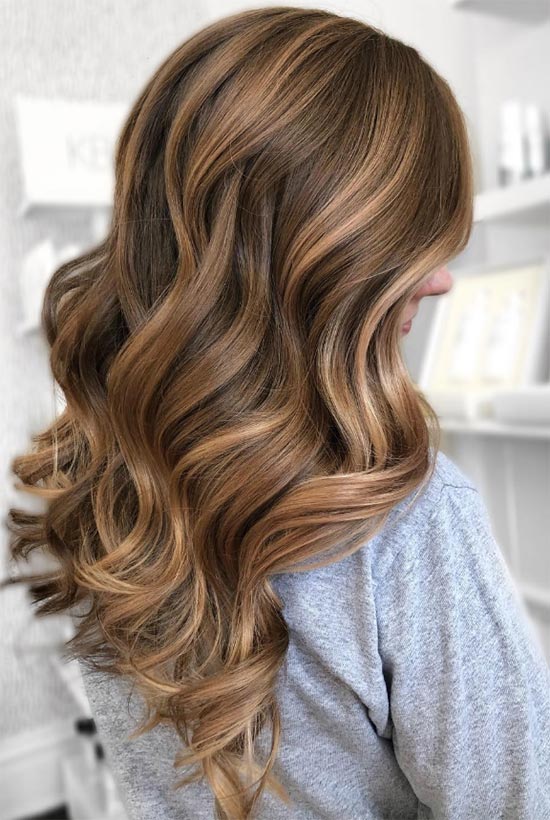
How Often Should You Wash Oily Hair?
There are plenty votes on both ends of the spectrum. Washing more frequently will get rid of the excess oil that’s plaguing your strands, sure. But more frequent stripping of your hair’s natural oils can trigger the production of even more.
Washing less may train your scalp to produce less, but how do you deal in the meantime? Well, water washing (rinsing your hair with warm water and working it through with your hands) really only helps to redistribute the oil, not remove it.
If you have thick hair, that could be very helpful, especially if you have drier ends. This may seem odd, but darker hair color can look washed out when it is shampooed too frequently, even if the color is natural.
Point blank, shampooing your hair every day is not recommended. If you have oily hair and just cannot deal with it, becoming friends with dry shampoo will greatly improve your hair.
If you are worried about issues while you are on the go, blotting sheets will work in a pinch, especially around your hairline. Dry shampoo, however, will connect to the dirt, oil and debris in your hair, and you can brush it out. It also adds a bit of texture, giving you a fresh feel and a refreshed look on your hair.
If you are very active, meaning you visit the gym every day, you will need to wash your oily hair more often. Try going every other day and using dry shampoo in between.
For curlier and thicker hair, try once to twice per week at the max. This won’t replace a shampoo but it will get rid of enough of the oil that you can comfortably wait another day at least.
The powder form and aerasol spray form are both reliable and easy to use. The powder might even be better for those who prefer to DIY their own products. It is very easy to make, and there are a ton of recipes, most using arrowroot powder or cornstarch as the base.
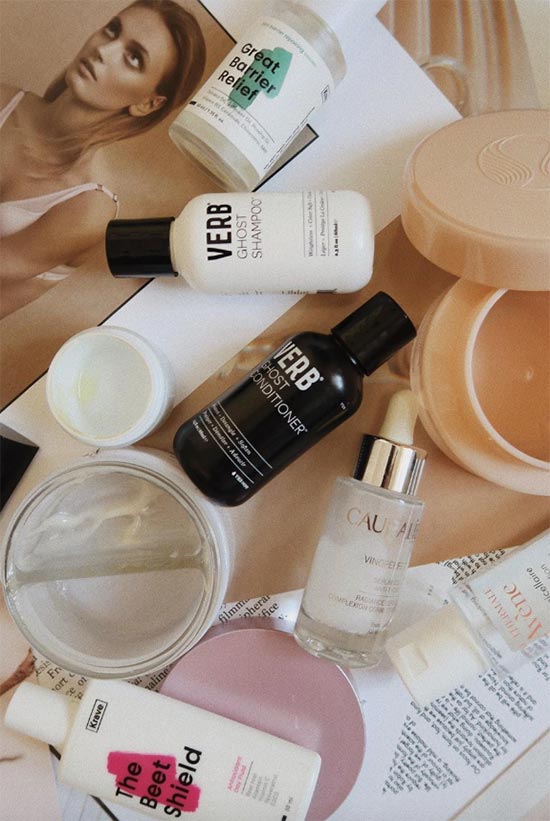
How to Get Rid of Oily Hair?
If you have been fighting with your hair being greasy or oily for as long as you remember or if it is a situation that has recently developed, take comfort in the fact that this does not have to be your future as well. You can overcome oily hair! Thanks to current science we know that there are various causes for oily hair and we have specialized ways to treat this issue.
The easiest of these treatment options is a good shampoo for oily hair that is designed to mitigate the production of sebum from your scalp. Please keep in mind that sebum is produced as a healthy protectant for your hair. Too much of anything can be bad, but your hair is oily because of an overproduction or something natural, not a foreign issue.
Study Your Hair to Treat It Accordingly
Study your hair, and be prepared for the testing process to take a bit of time.
- Is your hair fine or thick?
- How long is your hair?
- What is your hair texture?
- When did you notice your hair becoming greasy? Did you recently move, switch diets, change hairstyles?
- What have you already tried?
The reason for these questions is to help you figure out what to do to treat your problem. For example, thicker, curlier hair may be dry on the ends even with an oily scalp because the oil needs help to reach the ends.
Remember sebum is designed to protect your hair, and if it is trapped on your scalp you may have dry ends. This is especially true in cases of thicker, curlier hair, and very long hair so it is recommended that you try to evenly distribute the oil, which means you will no longer have dry, frizzy and split ends (though split ends must be trimmed first, but shouldn’t reoccur as often once you begin working the oil through your hair).
This will not work for fine or medium thickness straight hair though. In these cases, it isn’t that the oil is trapped on your scalp, it is just an overproduction issue. In straight hair, oil doesn’t have too much difficulty reaching the ends of short or medium length straight hair so distribution isn’t your problem.
Additionally, there is contention over whether you should wash your oily hair more often versus less often. At the time of this article being written, there is no base fact that will favor or eliminate either opposing view, so it is safe to suggest that you can rely on what you believe works for you.
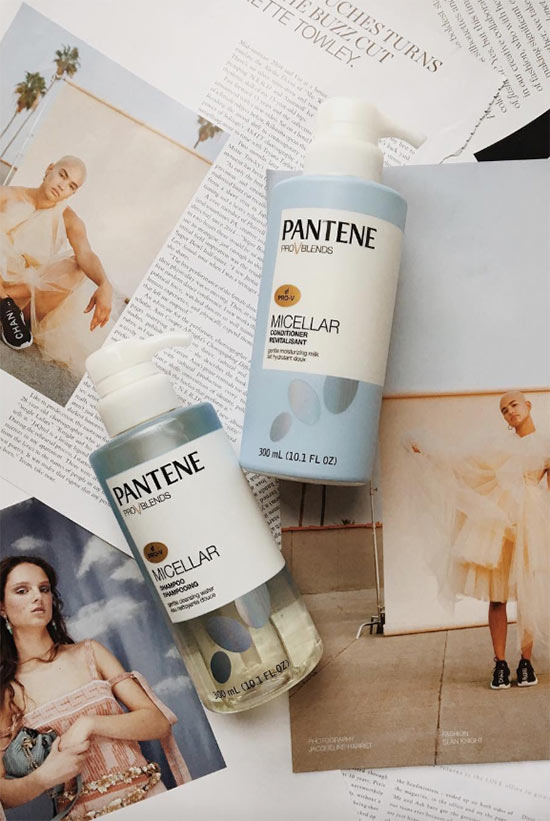
Tips for Getting Less Greasy Hair
The most obvious and helpful tool in getting less oily hair is to utilize a shampoo for oily hair. You may have been overdoing it if you use a shampoo and conditioner set designed to impart more moisture if your hair is already at optimal levels.
Perhaps you are washing too often or not often enough. Knowing when the change started and what started it is key to choosing the best shampoo for oily hair to resolve your situation.
- If changing hair products doesn’t work, or worse, it makes your hair and scalp dry, don’t skip the conditioning step, just switch your wash routine. Condition first, then shampoo after to make certain there is no excess in your hair.
- Thoroughly rinse your hair with cool water to close the cuticle and prevent overproduction of sebum from your scalp.
- Try to let your hair air-dry as much as possible to prevent the heat from helping your scalp product excess oil.
- Brush your hair normally to help evenly distribute the oil and prevent a build-up on your scalp.
- Don’t touch your hair to avoid transferring oils from your fingertips to your hair.
- If you want to condition your hair, try conditioning just the tips of your hair.
- Try an apple cider vinegar rinse several times a week. If you decide to wash your hair less often this is especially helpful. Apple cider vinegar will work like a clarifying treatment that cuts through the oil without any additional chemicals. Combine 8 oz. of warm or room temperature water with 3 tablespoons of apple cider vinegar (with or without the mother in it) into a bottle with a nozzle on it. Wash your hair (or water wash your hair if you are choosing to wash your hair less often). Douse your wet hair and scalp with this solution from root to tip. Allow it to sit in for a few minutes (5 to 10 minutes is good), then rinse your hair well with cool water.
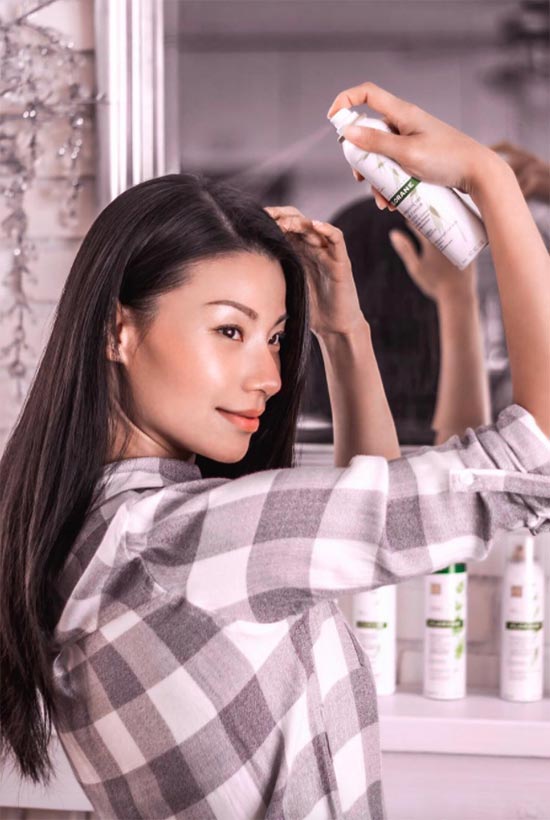
Photos via @hairbybritny, Instagram

